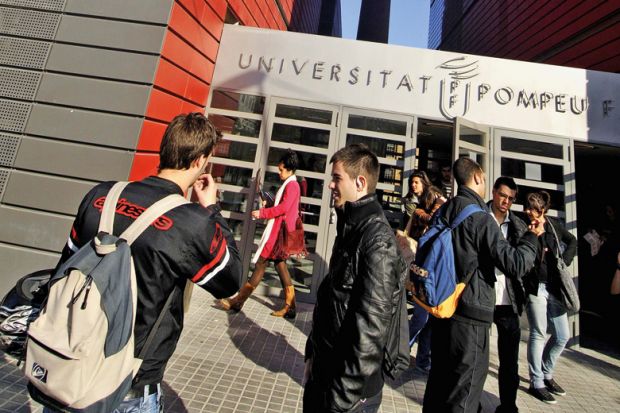Browse the full list of the world's top 150 universities under 50 years old
Pompeu Fabra University is celebrating its 25th anniversary this academic year, at a time when profound changes are happening in higher education around the world.
Universities have reached a turning point. The familiar, local arena in which we traditionally competed is now global, complex and constantly changing. Spanish universities must compete for the same talent, funding and resources as the world’s top institutions, only with a much smaller budget. Moreover, we have to work in a relatively rigid, overly regulated environment, with a uniform size-based funding system that does not sufficiently take into account decisive aspects such as performance, competitiveness or universities’ contributions to society.
In this context, UPF has achieved good results over the past few years, including strong teaching quality indicators and research results that have increased exponentially in recent times. This has been possible thanks to the quality and competitiveness of our faculty and researchers, the commitment and dedication of our staff, and the hard work and talent of our students.
We have also created a model of an urban university that is intimately linked to the city of Barcelona. In this regard, being young and small has allowed us to be more proactive and flexible in today’s changeable environment.
My primary commitment to UPF today is to ensure that it is recognised as a world-class player in society, as a university renowned for its teaching and scientific output that prioritises providing original and effective responses to social needs. To this end, we have designed and begun to implement various strategic institutional projects.
Coinciding with our 25th anniversary, we developed our Strategic Plan 2016-2025, based on five strategic areas (teaching, research, the university community, outreach and reputation, and finance and governance) and two mainstreamed priorities (internationalisation and social commitment). Our ambitions require us to further strengthen our internationalisation, to foster interdisciplinary and multidisciplinary learning, to update the learning process both in and outside the classroom, and to promote innovative forms of governance and management. Consequently, the Strategic Plan, which was drawn up with the participation of the entire university community, lays out the lines that we wish to pursue in the coming years to consolidate our leadership and become an active player in the transformation and modernisation that the university system so requires.
Claim a free copy of the full 150 Under 50 Rankings 2016 digital supplement
We are also implementing reforms with a view to becoming a leaner and more agile organisation. To this end, we have created eight academic coordination units (one for each field of knowledge at UPF) to integrate the many tasks already being performed in the different departments and faculties into a single unit. In a context in which universities must be flexible, dynamic and highly adaptable, creating these units will allow us to streamline and simplify decision-making.
Third, we have evaluated the research carried out by our departments using a pioneering method in Spain designed with the support of the Catalan University Quality Assurance Agency (AQU Catalunya). This is the first time nationwide that national and international experts from outside the institution have evaluated the research carried out at a university. The aim of this evaluation process is to detect the strengths and weaknesses of our departments in order to improve our future results at the international level. Our goal is to strengthen our role as a high-level international research organisation, and I am convinced that this diagnostic process, which in my view should be conducted every five years, will help us to do so.
Finally, mention must be made of UPF’s teaching model, which is increasingly oriented towards the customisation and personalisation of studies. In this regard, we have designed two new three-year bachelor’s degree programmes targeted at international students (in global studies and bioinformatics). With these programmes, to be taught exclusively in English and launched in September, we hope to raise the international profile of our university system.
Our ambitious projects reflect our efforts to differentiate our university: streamlining our organisation, evaluating our research and implementing an educational model based on personal attention are all plans intended to position us on the global stage as a university that both wants to and does do things differently. Some may think that these initiatives will affect the very foundations of the university, and so it may be. However, sometimes one needs to shake up the foundations in order to build a more solid structure.
Jaume Casals
Rector, Pompeu Fabra University
后记
Print headline: Entering a global age




